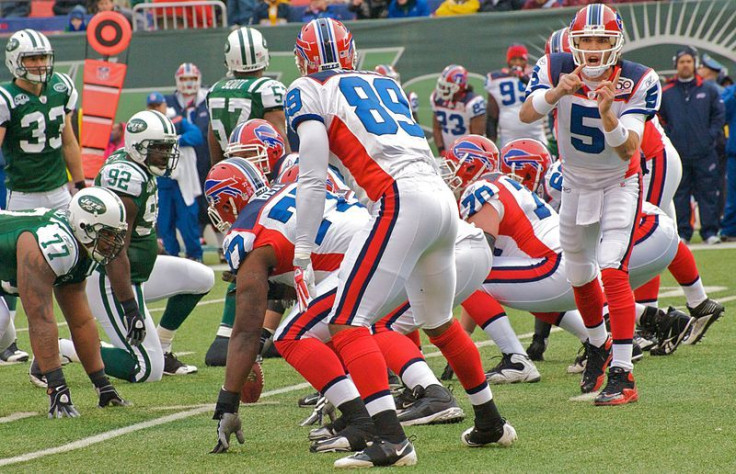NFL Players To Give Blood Samples For HGH Testing; Does HGH Cause More Harm Than Good?

The first day of training camp for National Football League (NFL) players will require them to roll up their sleeves not just for exercise but for human growth hormone (HGH) testing. The decision to conduct the testing in the league came from a 2011 collective-bargaining agreement (CBA) between the NFL and the National Football Players Association (NFPLA) after the initial lockout in that same year. According to the July 2011 CBA, Article 9, Section 7, "both annual blood testing and random blood testing for human growth hormone" will be implemented as part of the NFL's drug policy, reports USA Today.
The notion has now been revisited recently to be a part of a population study that will be used to evaluate what is deemed a normal HGH level for an NFL player. The NFLPA remains hesitant about the study's researchers using HGH levels of NFL players to tests conducted by the World Anti-Doping Agency (WADA) because of the NFL players' bigger-than-average body size. Anti-doping experts assure the NFLPA and NFL that WADA has conducted tests that included the samples of football players who resemble similar body shapes to the average NFL player. Blood testing among NFL players could shape the future of the sport, finally weeding out players who have abused the league's lack of HGH testing. "This highlights the problems we've had with (the union) on HGH testing. It's a blind spot," said Adolpho Birch, NFL's senior vice president of law and labor policy, to CBS Sports.
HGH How It Affects The Body
Approved use of HGH is highly common among persons, who have a growth hormone deficiency, because HGH helps them increase their bone density and muscle mass. The pituitary gland is responsible for production of the hormone in order to help maintain the tissues and organs in the human body, says Mayo Clinic. In adults, the hormone is injected in the body to promote normal growth of bones and muscles, decrease body fat, and increase physical endurance.
HGH Use And NFL Players
HGH use among pro athletes is illegal because it is considered to be a performance-enhancing drug that can give competitors a slight advantage above their opponents. In the NFL, HGH testing has not been implemented, leaving room for several players to take illegal matters into their own hands without the danger of getting caught. According to the Milwaukee Journal Sentinel, an NFC starter, who chose to remain anonymous, affirms HGH use in the NFL. "It's like clockwork nowadays," he said. The report goes on to comment on the trend in the NFL that players are getting bigger in size, stronger in muscle mass, and faster in pace, all of which HGH use helps promote. "So when athletes take it, the idea is that they're going to build muscle. What's been shown - which is very clear - is if the adult takes human growth hormone, they'll get increased lean muscle mass," Dr. Patrick Jost, an orthopedic surgeon in Milwaukee, said to the Milwaukee JS.
HGH In Injury Recovery
Professional athletes are prone to injuries and therefore often given HGH to repair a wear and tear. According to the HGH Medical Clinic in Puerto Vallarta, Mexico HGH can expedite healing, especially in sports injuries, because of its potent effect on the bone and muscle tissue. Athletes may take HGH for sports injuries and then realize how it can enhance their performance once they have fully recovered from their injury. While the benefits of HGH post-operative surgery are evident, HGH use on a regular basis can have detrimental health effects on normal adults.
HGH Health Effects
Long-term HGH use might increase the risk of developing cancer for athletes, says a review published in the journal of Pharmacological Research. Patients who have an excess of hormone production or are regularly treated with HGH are at risk of developing cancer because high levels of IGF-1 (insulin-like growth factor 1) promote cell cycle progression and have been linked to colon, breast, and prostate cancers. According to Mayo Clinic, other side effects of HGH use may include:
- Carpal tunnel syndrome
- Swelling in the arms and legs
- Joint pain
- Muscle pain
- For men, enlargement of breast tissue (gynecomastia)



























